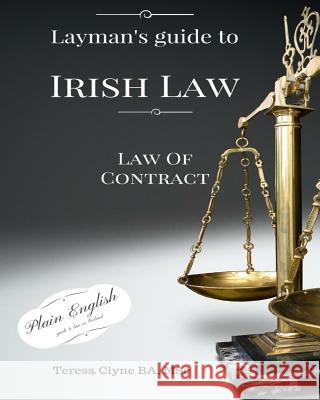Layman's Guide to Irish Law: The Law of Contract » książka
Layman's Guide to Irish Law: The Law of Contract
ISBN-13: 9781523795949 / Angielski / Miękka / 2016 / 168 str.
Legal writing in plain English. Law books using plain English which is easy to understand using clear concise plain wording. Welcome to my series of law textbooks for beginners. The Law of Contract Every day we enter contracts, most of those contracts are subconsciously entered into and we are rarely aware of the intrinsic nature of a contract and all of the essential elements which must be fulfilled in order to have a legally binding and enforceable contract, we simply take the law of contract for granted. Simply buying a bottle of water or your morning coffee affords the same legal principles as buying a car or entering into a million euro business deal. Contracts do not need to be in writing to be enforceable, on the contrary, if you were to have a written contract every time you went to the shop for a paper or to buy a coffee there would be some very long queue's as you would have to write the terms of the contract down and sign it, time consuming and frivolous as very little actually selling would be done due to the time which it would take per person to put all of the essential elements of a contract in writing. There are some contracts which require a written and signed deed (written document or agreement) mainly the sale and purchase of land, property, commercial property and loans. If you are buying or selling something of course you can request that this sale or purchase be written down, you can set your own rules and as long as they are not breaching any legal rules or legislation and the other persons signs then you can pretty much set out whatever rules you want, however for most sales or purchases this is a formality and not a requirement for the contract to be binding on both parties. Agreements create obligations. Therefore, any agreement that is enforceable in a court of law is a contract and no person should be bound unless they have given their informed and true consent to the contract. What is a Contract? Formation of a Contract Offer Distinction between Offer and Invitation to Treat Termination of an offer Acceptance The Postal Rule (for acceptance) Intention to Create Legal Relations Family, Domestic or Social Commercial Arrangements Consideration Consideration in Bilateral Contracts Unilateral Contracts Executed and executory consideration Executed Consideration Executory Consideration Rules of Consideration Must be sufficient, but need not be adequate Consideration must not be 'past' Must not be more than the party already has to do Doctrine of privity of contract Capacity Minors Contracts which are always considered valid unless repudiated Contracts which are always considered void Persons of unsound mind Intoxication Companies Contents of a Contract Condition Warranty Term or representation Express terms Implied Terms Matter of Fact Officious Bystander Test Matter of Law Implied under Statute Terms implied by the Courts Implied by Custom The Parol Evidence Rule Innominate term Onus of proof Mistake Unilateral or bilateral mistake Common Mistake Section 7 of the Sale of Goods Act 1893 Mutual Mistake - Mutual misunderstanding Unilateral Mistake Mistaken Identity Remedies for Mistake Damages Rectification Recission Specific Performance Exemption Clauses The legal effects of exemption/limitation clauses Limitation Clause Exclusion Clauses Incorporated by Signature Electronic Signature Reasonable Steps Reasonable Notice Incorporation by Course of Dealings Main purpose rule Bars to exclusion/limitation clauses Misrepresentation Collateral Undertakings Unconscionable Bargain Contra Proferentem Vitiating factors, discharge and remedy Duress Threats of the person (force or violence) Threats to property (or goods) Threats to sue Economic Duress Pressure Unlawful pressure Causation Remedies for Duress Bars to remedies Undue Influence Presumed Undue Influence Special relationships Unconscionable Bargain Remedies for Undue Influence
Zawartość książki może nie spełniać oczekiwań – reklamacje nie obejmują treści, która mogła nie być redakcyjnie ani merytorycznie opracowana.











